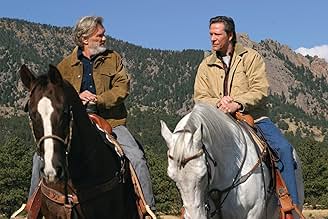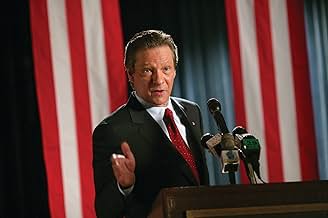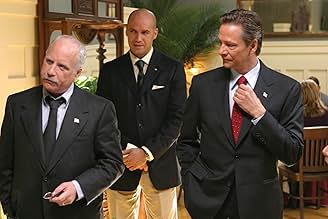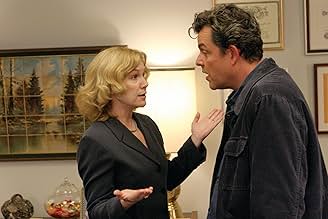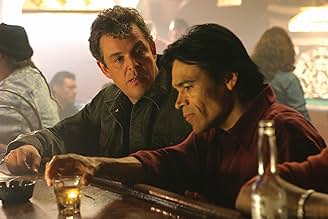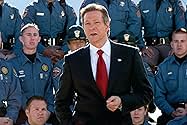VALUTAZIONE IMDb
6,0/10
4318
LA TUA VALUTAZIONE
Aggiungi una trama nella tua linguaThe discovery of a corpse threatens to unravel a bumbling local politician's campaign for governor of Colorado.The discovery of a corpse threatens to unravel a bumbling local politician's campaign for governor of Colorado.The discovery of a corpse threatens to unravel a bumbling local politician's campaign for governor of Colorado.
- Regia
- Sceneggiatura
- Star
- Premi
- 1 vittoria e 1 candidatura in totale
Recensioni in evidenza
I'm surprised at the opening negative reviews this film is receiving on the board. The suggestion this film is the worse Sayles had to offer gives his last couple films a better rating than they deserve -- the baby adoption one seemed unfinished and the one with the Florida (?) resort building was a bit bland to say the least. It is quite true that Silver City does not meet the standards of "Lone Star" and other great Sayles films -- he has gone into a bit of a slump. Still, this film suggests we might hope he is climbing out of it.
The film still seems more about sending messages than entertaining. The obvious Dubya clone is too broad, and we don't we see how he ticks. Richard Dreyfuss is great as the campaign director, though he too doesn't really get another screen time. Still, on the whole, there is a lot to offer, especially the sense of place (though some of the mountains look like fake background). Sayles also offers some great supporting characters, as always. Daryl Hannah must be underlined here; she is quite a find -- who knew?
Liking the film, I guess, depends on liking the former news reporter given the role to investigate an embarrassing find. I enjoyed Danny Huston's character and found his investigations handled well. The caterer/chef he hires to help him out also gives a nice performance as does Huston's ex-g/f, the reporter. As do others they both meet along the way. For instance, the scenes involving an investigative website and rightwing talk show host were enjoyable.
The film ends on a realistic note that is refreshing. It tells a story, stories actually, while preaching its message. And, some of the "bad guys" (including Kris Kristofferson) are not portrayed as evil slimebags or anything, adding a sense of fairness to the whole thing.
A flawed movie that remains an enjoyable movie for mature moviegoers.
The film still seems more about sending messages than entertaining. The obvious Dubya clone is too broad, and we don't we see how he ticks. Richard Dreyfuss is great as the campaign director, though he too doesn't really get another screen time. Still, on the whole, there is a lot to offer, especially the sense of place (though some of the mountains look like fake background). Sayles also offers some great supporting characters, as always. Daryl Hannah must be underlined here; she is quite a find -- who knew?
Liking the film, I guess, depends on liking the former news reporter given the role to investigate an embarrassing find. I enjoyed Danny Huston's character and found his investigations handled well. The caterer/chef he hires to help him out also gives a nice performance as does Huston's ex-g/f, the reporter. As do others they both meet along the way. For instance, the scenes involving an investigative website and rightwing talk show host were enjoyable.
The film ends on a realistic note that is refreshing. It tells a story, stories actually, while preaching its message. And, some of the "bad guys" (including Kris Kristofferson) are not portrayed as evil slimebags or anything, adding a sense of fairness to the whole thing.
A flawed movie that remains an enjoyable movie for mature moviegoers.
I was disappointed by this. Oh, it is great fun goofing on any politician, the more smarmy and sanctimonious the better. But I can get political goofs by the dump truck load from elsewhere. What I expected was something as gently incisive as, say, "Doonesbury," but with the cinematic skills we know Sayles has. Something as gentle and sharp as "tanner on Tanner."
We have three threads here. The first is the depiction of the system, the handlers and supporters that "make" a president. We all know how it is; many politicians admit it and nearly all journalists report on it. There isn't a shred of newness in this thread, and surely not out of Dreyfuss.
There's a second component having to do with the story that wraps the thing. Now here is where I expected some art. What we end up with a single big corporation as the bad guy, no, beyond that a single corporate man. Then we see how his misdeeds unravel a bit. Sure, we have payoffs, bribery, rampant disregard for the environment and a cover-up.
But see. The thing to make fun of is how some reduce big complex issues to simple narratives. How they take a million threads of a complex tapestry with inscrutable hues and patterns and reduce it to a paper towel with flag patterns. So why do the same thing when satirizing them? Why? It isn't as if there aren't people in the film world incapable of doing this? Or was it just a rush job?
Most people let all that slip because Chris Cooper's version is too delicious. Here's the problem with this: its not disturbing enough. The thing with the target's speech is how he needs to have his mouth work, but his mind cannot produce the coherent thought fast enough, so it looks for stored phrases and tries to evaluate them for appropriateness on the fly. This gives both odd pauses and sometimes goofy leaps in concepts and metaphors.
Listen to Cooper and pay attention to the leaps. Both are fabricated for dramatic effect. The pauses are regular. They're not even, but they have multiples: pause, twice as long three times as long. And they have a rhythm that if you listen makes a sort of sense.
Now look at the linguistic leaps. They have the same patterns, regular semantic distances. That's because we as viewers have to be in on the joke. We know he will jump and precisely how far. We just don't know the direction. See, humor is in the unexpected and in order for it to work, you need to set expectations.
Now, dear reader, listen to the target. He is not creating something as art, he is just living. What you will find is a well-studied artifact of a man whose cognitive centers have been damaged by cocaine saturation. There is no regularity. Pauses are random. The semantic distances are random. That's the whole point. This is what you find in substance abusers. Always. It is not dumbness but drug damage.
Oddly the National Institutes of Health had a great research program on this because all sorts of conditions like Alzheimers can be diagnosed by measuring these speech effects. But once the link was make to cocaine users, the program was terminated. Now that would make a good movie, Huh?
Ted's Evaluation -- 2 of 3: Has some interesting elements.
We have three threads here. The first is the depiction of the system, the handlers and supporters that "make" a president. We all know how it is; many politicians admit it and nearly all journalists report on it. There isn't a shred of newness in this thread, and surely not out of Dreyfuss.
There's a second component having to do with the story that wraps the thing. Now here is where I expected some art. What we end up with a single big corporation as the bad guy, no, beyond that a single corporate man. Then we see how his misdeeds unravel a bit. Sure, we have payoffs, bribery, rampant disregard for the environment and a cover-up.
But see. The thing to make fun of is how some reduce big complex issues to simple narratives. How they take a million threads of a complex tapestry with inscrutable hues and patterns and reduce it to a paper towel with flag patterns. So why do the same thing when satirizing them? Why? It isn't as if there aren't people in the film world incapable of doing this? Or was it just a rush job?
Most people let all that slip because Chris Cooper's version is too delicious. Here's the problem with this: its not disturbing enough. The thing with the target's speech is how he needs to have his mouth work, but his mind cannot produce the coherent thought fast enough, so it looks for stored phrases and tries to evaluate them for appropriateness on the fly. This gives both odd pauses and sometimes goofy leaps in concepts and metaphors.
Listen to Cooper and pay attention to the leaps. Both are fabricated for dramatic effect. The pauses are regular. They're not even, but they have multiples: pause, twice as long three times as long. And they have a rhythm that if you listen makes a sort of sense.
Now look at the linguistic leaps. They have the same patterns, regular semantic distances. That's because we as viewers have to be in on the joke. We know he will jump and precisely how far. We just don't know the direction. See, humor is in the unexpected and in order for it to work, you need to set expectations.
Now, dear reader, listen to the target. He is not creating something as art, he is just living. What you will find is a well-studied artifact of a man whose cognitive centers have been damaged by cocaine saturation. There is no regularity. Pauses are random. The semantic distances are random. That's the whole point. This is what you find in substance abusers. Always. It is not dumbness but drug damage.
Oddly the National Institutes of Health had a great research program on this because all sorts of conditions like Alzheimers can be diagnosed by measuring these speech effects. But once the link was make to cocaine users, the program was terminated. Now that would make a good movie, Huh?
Ted's Evaluation -- 2 of 3: Has some interesting elements.
So, at first I was skeptical. I thought, oh boy another clichéd jab at George W. Bush. There was some of that but the movie went further and came out pretty decent. See, Bush isn't my favorite but I'm not so obsessed to want to watch an entire movie about it.
OK, so this "fictional political candidate" -- basically Chris Cooper doing a good George W. impression -- is a bumbling idiot named Dicky Pillager (oh, my hand...it's so HEAVY!) who is not so much a "bad guy" as the people around him are. The movie is a fun exploration of Dick's diverse family and the frightening political machine of his PR team. It slowly turns into a mystery story, kind of like Chinatown or some private eye story with a high angle of a smoky office shot through a lazy ceiling fan. This movie has no smoky office with a fan though.
It's a decent story. I'm sure there are some "clever" jabs at the current president that we've heard a million times before. "Oh, he's killing the earth!" kind of stuff. It's not as irritating and self-righteous as it sounds. There are some jabs right back at the "crazy hippies" running a scathing anti-Pillager website. It's good to consider that what you think is true about your elected leaders is the product of spin doctoring and grooming.
Good actors, decent story, not bad.
OK, so this "fictional political candidate" -- basically Chris Cooper doing a good George W. impression -- is a bumbling idiot named Dicky Pillager (oh, my hand...it's so HEAVY!) who is not so much a "bad guy" as the people around him are. The movie is a fun exploration of Dick's diverse family and the frightening political machine of his PR team. It slowly turns into a mystery story, kind of like Chinatown or some private eye story with a high angle of a smoky office shot through a lazy ceiling fan. This movie has no smoky office with a fan though.
It's a decent story. I'm sure there are some "clever" jabs at the current president that we've heard a million times before. "Oh, he's killing the earth!" kind of stuff. It's not as irritating and self-righteous as it sounds. There are some jabs right back at the "crazy hippies" running a scathing anti-Pillager website. It's good to consider that what you think is true about your elected leaders is the product of spin doctoring and grooming.
Good actors, decent story, not bad.
Dickie Pilager is running for governor of Colorado. He's a good-looking frat boy with a dubious past that includes at least one drunken-driving charge. But he comes from a politically influential family and his daddy's a powerful U.S. senator. Dickie, however, lacks panache. He can't put together a simple sentence without stumbling. He's terrible when he's unscripted, cannot function without a teleprompter, doesn't have a clue what he's talking about, reduces policies to simple catch-phrases, but the wealthy contribute generously to his campaign and he's awfully "user-friendly" to big business. As one character in "Silver City" points out, Dickie sounds gubernatorial on TV when the sound's muted. Sound familiar?
In "Silver City," writer/editor/director John Sayles rolls a "Chinatown"-esque murder mystery, cynical political commentary and pointed observations about contemporary media into one film that succeeds more often than not. There are moments when I got the impression Sayles was trying too hard to drive home his point about Dickie's incompetence. As fun as it might have been to mock Dickie, he's too easy a target. The greasy players around Dickie - for instance, his handler Chuck Raven (played with smarmy charm by Richard Dreyfuss) - are far more interesting. Where "Silver City" crackles is in its distrust of our political system, the influence of slimy corporate types on candidates and ineptitude of the media.
Despite this being one of Sayles' weaker films, he remains one of the finest filmmakers this nation has produced in the last 25 years. His filmography contains some of the best independent films in recent memory - "Return of the Secaucus 7" (1980), "Lianna" (1983), "Matewan" (1987), "Eight Men Out" (1988), "Passion Fish" (1992), his masterpiece, "Lone Star" (1996) and "Men With Guns" (2000). Even much of his lesser-known works, "City of Hope" (1991), "The Secret of Roan Inish" (1994) and "Limbo" (1999), are remarkable pieces of storytelling. He's also socially conscious, acutely aware of the importance of shedding light on social problems, be they the plight of immigrants, childless couples or corruptibility of politicians.
What's ultimately a bit disappointing about "Silver City" is not so much its multi-layered story, but Sayles' inability to keep it tightly wound. As much as I admire Sayles, another editor with a fresh set of eyes might have helped tremendously.
He's deftly handled multi-story plots before, but this film doesn't seem keenly focused. Sayles weaves too many threads that don't patch together all that well. He relies a bit too much on coincidence - especially using two migrant workers in a pivotal plot point - to unravel his mystery and many interesting subplots and characters remain dangling, most glaringly a subplot involving reporter Nora (an under-used Mario Bello) and her fiancé Chandler (Billy Zane), a self-proclaimed "champion of the underdog" - he's a big-business and tobacco lobbyist.
The actors, many of them Sayles regulars, are terrific, as usual. Chris Cooper plays Dickie with great aplomb, but Sayles surprisingly wastes other talented actors in throwaway roles. Tim Roth, Thora Birch and Daryl Hannah have little to do in roles that scream for more importance. Hannah gets some of the best dialogue, but her Maddy Pilager needed more screen time.
Sayles' Jake Gittes is reporter-turned-investigator Danny O'Brien, who's more akin to Elliot Gould's Marlowe than Bogart's. Danny Huston plays O'Brien with tremendous charm, but Huston lacks the magnetism of his sister, father or grandfather. David Strathairn might have worked better. Another Sayles regular, Joe Morton, would have been a fascinating choice.
Sayles' cynicism about our wimpy media and political process is well founded. We're, after all, living in an age when the media ignored the real story behind the Florida debacle in the 2000 election (the disenfranchisement of hundreds, if not thousands, of black voters); reporters shirk their duties for fear of being branded as unpatriotic; major newspapers issue mea culpas for swallowing everything this administration served up, never questioning its motives in the lead up to the (utterly meaningless and pointless) war in Iraq; political candidates hold "town meetings" with pre-screened audiences who sign loyalty oaths and serve up pre-arranged softball questions; and at least one TV news network's mostly a mouthpiece for a political party.
Sayles' forte's always been excellent dialogue and when he moves away from Dickie, the writing often is smart, piercing and worthy of his best work. There are two especially razor-sharp moments - between Chuck and Danny at a bar, and a post-coitus Maddy.
"Silver City" is by no means mediocre. And, frankly, even mediocre Sayles would be better than most of what Hollywood makes. Though this film still is better than most at the multiplex right now, this is sub par Sayles. He set the standard so high with "Matewan" and "Lone Star" that we expect better from him.
"Silver City" concludes on a symbolic, cautionary note about the dangers of allowing the Dickie Pilagers of this world to win. The scary thing is we already have a real-life Dickie Pilager. And despite his good intentions, he's more dangerous than anyone fiction could ever create.
In "Silver City," writer/editor/director John Sayles rolls a "Chinatown"-esque murder mystery, cynical political commentary and pointed observations about contemporary media into one film that succeeds more often than not. There are moments when I got the impression Sayles was trying too hard to drive home his point about Dickie's incompetence. As fun as it might have been to mock Dickie, he's too easy a target. The greasy players around Dickie - for instance, his handler Chuck Raven (played with smarmy charm by Richard Dreyfuss) - are far more interesting. Where "Silver City" crackles is in its distrust of our political system, the influence of slimy corporate types on candidates and ineptitude of the media.
Despite this being one of Sayles' weaker films, he remains one of the finest filmmakers this nation has produced in the last 25 years. His filmography contains some of the best independent films in recent memory - "Return of the Secaucus 7" (1980), "Lianna" (1983), "Matewan" (1987), "Eight Men Out" (1988), "Passion Fish" (1992), his masterpiece, "Lone Star" (1996) and "Men With Guns" (2000). Even much of his lesser-known works, "City of Hope" (1991), "The Secret of Roan Inish" (1994) and "Limbo" (1999), are remarkable pieces of storytelling. He's also socially conscious, acutely aware of the importance of shedding light on social problems, be they the plight of immigrants, childless couples or corruptibility of politicians.
What's ultimately a bit disappointing about "Silver City" is not so much its multi-layered story, but Sayles' inability to keep it tightly wound. As much as I admire Sayles, another editor with a fresh set of eyes might have helped tremendously.
He's deftly handled multi-story plots before, but this film doesn't seem keenly focused. Sayles weaves too many threads that don't patch together all that well. He relies a bit too much on coincidence - especially using two migrant workers in a pivotal plot point - to unravel his mystery and many interesting subplots and characters remain dangling, most glaringly a subplot involving reporter Nora (an under-used Mario Bello) and her fiancé Chandler (Billy Zane), a self-proclaimed "champion of the underdog" - he's a big-business and tobacco lobbyist.
The actors, many of them Sayles regulars, are terrific, as usual. Chris Cooper plays Dickie with great aplomb, but Sayles surprisingly wastes other talented actors in throwaway roles. Tim Roth, Thora Birch and Daryl Hannah have little to do in roles that scream for more importance. Hannah gets some of the best dialogue, but her Maddy Pilager needed more screen time.
Sayles' Jake Gittes is reporter-turned-investigator Danny O'Brien, who's more akin to Elliot Gould's Marlowe than Bogart's. Danny Huston plays O'Brien with tremendous charm, but Huston lacks the magnetism of his sister, father or grandfather. David Strathairn might have worked better. Another Sayles regular, Joe Morton, would have been a fascinating choice.
Sayles' cynicism about our wimpy media and political process is well founded. We're, after all, living in an age when the media ignored the real story behind the Florida debacle in the 2000 election (the disenfranchisement of hundreds, if not thousands, of black voters); reporters shirk their duties for fear of being branded as unpatriotic; major newspapers issue mea culpas for swallowing everything this administration served up, never questioning its motives in the lead up to the (utterly meaningless and pointless) war in Iraq; political candidates hold "town meetings" with pre-screened audiences who sign loyalty oaths and serve up pre-arranged softball questions; and at least one TV news network's mostly a mouthpiece for a political party.
Sayles' forte's always been excellent dialogue and when he moves away from Dickie, the writing often is smart, piercing and worthy of his best work. There are two especially razor-sharp moments - between Chuck and Danny at a bar, and a post-coitus Maddy.
"Silver City" is by no means mediocre. And, frankly, even mediocre Sayles would be better than most of what Hollywood makes. Though this film still is better than most at the multiplex right now, this is sub par Sayles. He set the standard so high with "Matewan" and "Lone Star" that we expect better from him.
"Silver City" concludes on a symbolic, cautionary note about the dangers of allowing the Dickie Pilagers of this world to win. The scary thing is we already have a real-life Dickie Pilager. And despite his good intentions, he's more dangerous than anyone fiction could ever create.
You'll never look at "W" again without thinking of Dickie Pilager! Nice piece of political satire and all too true. Well shot...well acted... and well directed. The characters are slightly "comic bookish" but consider their real life counterparts.
Be sure to look at the "Additional features" on the DVD. It contains some very pointed social commentary from some very concerned and talented individuals. This movie is probably more important now that we have had the election outcome of 2004.
The Haskell Wexler cinematography is really excellent. Be sure to notice the backgrounds when he is interviewed!
Be sure to look at the "Additional features" on the DVD. It contains some very pointed social commentary from some very concerned and talented individuals. This movie is probably more important now that we have had the election outcome of 2004.
The Haskell Wexler cinematography is really excellent. Be sure to notice the backgrounds when he is interviewed!
Lo sapevi?
- QuizThe Bentel company logo is a direct copy from Bechtel Corporation which is a real American defense contractor.
- BlooperWhen Danny is splashing in the mine, the type of flashlight he is holding changes several times.
- ConnessioniReferenced in Tell Them Who You Are (2004)
- Colonne sonoreMining for Gold
Written by Philip Thomas and James Gordon
Performed by Cowboy Junkies
Courtesy of BMG Music Canada Inc.
Under license from BMG Film & TV Music
I più visti
Accedi per valutare e creare un elenco di titoli salvati per ottenere consigli personalizzati
- How long is Silver City?Powered by Alexa
Dettagli
Botteghino
- Budget
- 5.000.000 USD (previsto)
- Lordo Stati Uniti e Canada
- 1.020.656 USD
- Fine settimana di apertura Stati Uniti e Canada
- 337.484 USD
- 19 set 2004
- Lordo in tutto il mondo
- 1.384.395 USD
- Tempo di esecuzione
- 2h 8min(128 min)
- Colore
- Mix di suoni
- Proporzioni
- 1.85 : 1
Contribuisci a questa pagina
Suggerisci una modifica o aggiungi i contenuti mancanti



